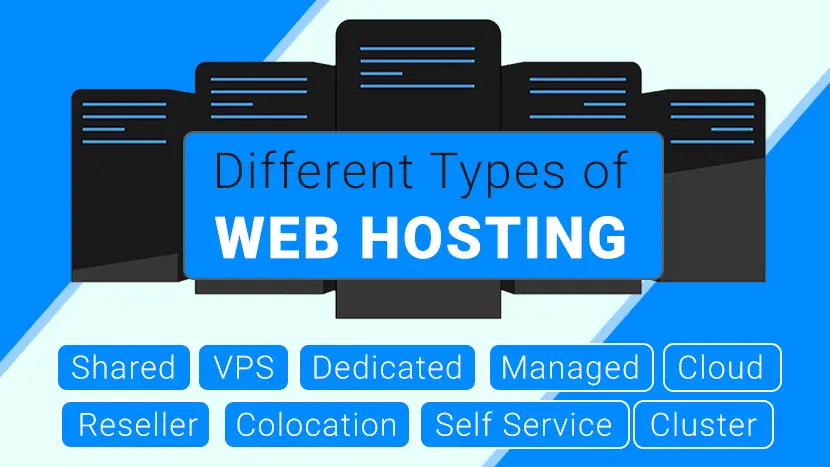10 Different Types of Web Hosting
Last updated on January 19, 2025 by RGB Web Tech

There are different types of web hosting services. So, it can be very difficult to figure out which type of web hosting you need or choose.
In the article, I hope to teach you everything you need to know about web hosting. There are many kinds of web hosting. I can easily see how people get confused so quickly. I will cover the following:
- Shared Hosting — Shared hosting is the most cost-effective plan for entry-level websites.
- VPS Hosting — VPS hosting is for websites that have outgrown shared hosting.
- WordPress Hosting — WordPress hosting optimized for WordPress sites.
- Dedicated Hosting — Dedicated hosting is Enterprise-level servers for large websites.
- Cloud Hosting — Cloud hosting is best for websites that are growing rapidly.
- Reseller Hosting — Reseller hosting is for agencies, web developers, and web designers.
- Managed Hosting — Managed hosting is an IT hosting model in which the client leases servers or cloud computing resources.
- Colocation Hosting — Colocation hosting is where you rent space for your IT hardware at a 3rd party provider’s data center facility.
- Self Service Hosting — Self hosting is a form of running your own website or application by setting up a server and network yourself.
- Cluster Hosting — A Cluster hosting is a host that is configured to take over the role of another host server within a cluster.
Shared Hosting
Shared hosting is a type of web hosting where a single physical server hosts multiple sites. Many users utilize the resources on a single server, which keeps the costs low. Users each get a section of a server in which they can host their website files. Shared servers can host hundreds of users. Each customer using the shared hosting platform’s server has access to features like databases, monthly traffic, disk space, email accounts, FTP accounts and other add-ons offered by the host. System resources are shared on-demand by customers on the server, and each gets a percentage of everything from RAM and CPU, and other elements such as the single MySQL server, Apache server, and mail server.
VPS Hosting
VPS is short for a Virtual Private Server. VPS hosting is one of the most popular hosting services you can choose for your website. It uses virtualization technology to provide you with dedicated (private) resources on a server with multiple users.
It’s a more secure and stable solution than shared hosting where you don’t get a dedicated server space. However, it’s smaller-scale and cheaper than renting an entire server.
VPS hosting is usually chosen by website owners who have medium-level traffic that exceeds the limits of shared hosting plans but still don’t need the resources of a dedicated server.
WordPress Hosting
WordPress hosting is just hosting that has been optimized to better meet WordPress’ performance and security needs. It also typically includes one-click WordPress installs to make it easy to get started with WordPress. And some WordPress hosts will even automatically update your WordPress software as needed.
Dedicated Hosting
Dedicated hosting is a term used to describe web hosting packages that provide a dedicated server with dedicated resources to a single client. Dedicated hosting plans are ideal for WordPress websites with a very large number of visitors. Many WordPress hosting service providers offer Dedicated Hosting plans along with shared and VPS hosting plans.
Cloud Hosting
Cloud hosting is a type of web hosting which uses multiple different servers to balance the load and maximize uptime. Instead of using a single server, your website can tap into a “cluster” that uses resources from a centralized pool. This means that even if one server fails, another kicks in to keep everything running.
Visualize the cloud as a web of different computers which are all interconnected. As more machines are hooked up to the network, more resources are added to the overall cloud.
With cloud hosting, you get a part of the so-called cloud cluster. As opposed to traditional web hosting, where you get a certain amount of space from a single server.
The main benefits of cloud hosting include a major focus on uptime, isolated resources, easy scaling, and a dedicated IP address.
Reseller Hosting
Reseller web hosting is an option that involves one company (a hosting provider) renting hard drive space and bandwidth to another company (small-midsize business), who then rents the space to third parties (entrepreneurs-small business). Simply put, reseller hosting is the ability to provide hosting to your own clients as if you yourself were the web hosting company. This is typical for aspiring entrepreneurs who want to start their own web hosting firm or for current web developers and designers who desire to add additional services to their brand.
Managed Hosting
Managed dedicated hosting is an IT service model where a customer leases dedicated hardware from a managed hosting services provider. This solution includes servers, storage, and networking hardware. Because you aren’t sharing these resources with anyone else, it’s referred to as a single-tenant solution.
When you choose managed dedicated hosting, you get to choose your operating system while your service provider handles the administration, management, and support of your solution. And because you’re not sharing any of these resources with another tenant, you have access to the full performance capabilities of the hardware you’re leasing.
Colocation Hosting
Colocation hosting is a type of service a data center offers, in which it leases space and provides housing for servers. The clients own the servers and claim full authority over the hardware and software. However, the storage facility is responsible for maintaining a secure server environment.
Colocation services are not the same as cloud services. Colocation clients own hardware and lease space, with cloud services they do not have their hardware but lease it from the provider.
Colocation hosting should not be confused with managed (dedicated) services, as the second implies the data center also assumes management and maintenance control over the servers. With colocation hosting, the clients are the one who is responsible for supplying, maintaining, and managing their servers.
Self Service Hosting
Self-service web hosting is done completely on your own. This is the most advanced web hosting. You need to have a place to rent that stores your server. Then you’re responsible for the cooling, power, bandwidth, hardware, system administrator, backups, etc.
Cluster Hosting
Cluster hosting is sometimes confused with Cloud or Grid hosting. It is simply a group of servers that operate together and act as one “mega” server. The big difference between cluster hosting and cloud hosting is cluster hosting is over a smaller area. For instance, there could be a cluster of servers along the eastern coast of the United States.
Cluster hosts are typically billed on an hourly or monthly rate.
List of Popular Web Hosting Service Providers:
Read More : You can explore here 30+ Best Web Hosting Providers
Video - Best Web Hosting For Small Business
Affordable Website Hosting for your domainIf you found this article helpful, we encourage you to share it on your social media platforms—because sharing is caring! For more information about article submissions on our website, feel free to reach out to us via email.
Send an emailWritten by RGB Web Tech
Latest Technology Trends
Latest technology trends shaping the future, including AI advancements, blockchain innovation, 5G connectivity, IoT integration, and sustainable tech solutions. Explore breakthroughs in quantum computing, cybersecurity, augmented reality, and edge computing. Stay ahead with insights into transformative technologies driving innovation across industries and revolutionizing how we live, work, and connect.
What is Linux web hosting?
Last updated on January 19, 2025 by RGB Web Tech

Linux hosting is an open source operating system where web hosting services occur with the use of a Linux-based server.
Linux web hosting can be accessed by an organization or individual, and it’s generally one of the cheapest types of hosting services for small businesses.
It's user friendly and generally offers a high level of security, with many hosting companies sharing their hosting tools according to each customer’s requirements.
Linux web hosting allows its users to share between multiple servers, and the source code can be used, modified, and redistributed freely in both commercial and non-commercial capacities.
Users of Linux often rely on cPanel to manage web development tasks and some web hosting providers include cPanel in its packages despite it being a third party application.
Advantages of Linux Hosting
- Linux hosting provides flexibility and use of open source technologies such as Apache, PHP, and MySQL.
- This hosting service is one of the most reasonable and affordable options.
- Over the years, Linux has earned a reputation for stability and safety.
- The security settings on the Linux server are highly efficient and advanced when compared to a Windows platform.
- In the current technology world, versatility is highly desirable because it ensures relevance in an ever-changing playing field. Linux hosting is versatile because it is compatible with various databases.
Disadvantages of Linux Hosting
- Linux web hosting lacks compatibility with several of the primary Windows-based scripting applications and technology.
- Certain programming languages such as ASP and its extensions are not suitable on Linux operating systems.
- Linux servers are not useful for porting of websites that have been scripted or designed for a Windows environment or background.
Web Hosting on Linux
When you are planning to create a website, a web hosting package should offer various features. Some of the necessities to consider are bandwidth, domain, and affordability. Domains are necessary for hosting a professional internet site. As the site develops and grows, bandwidth becomes necessary as more information and functions increase. The market has many different companies that offer Linux and Windows hosting packages. Linux web hosting is the more practical and affordable choice because it is not restrictive and is more adaptable.
However, internet marketing requires a proper analysis of the needs of the business for the present and future. You can opt for a cost-effective Linux hosting package, make sure that it contains all the functionality required currently and in future. Additional features such as software and web-mail are important for websites as they develop and grow.
Differences Between Linux and Windows Web Hosting
As previously stated, the Linux hosting system has multiple features such as good performance, adaptability, cost effectiveness, security, stability and so on. Likewise, the Windows web hosting has its own features and strengths that are better suited for specific files and websites.
The main difference between the two is the type of files and functionalities that is used. A website needing PHP, Perl, WordPress, MySQL, SSH and applications that require specific Apache modules run better and more quickly on Linux-based web hosting because it is specifically designed for this type of data. On the other hand, a Windows platform is ideal to host ASP Classic, Microsoft Access, ASP.NET, Microsoft SQL Server, C# or Visual Basic Development.
The price is another big difference. Because Linux web hosting is more reasonably priced, it is the more popular option among web hosting providers. The Linux web hosting platform also has more features than Windows, making it many web designer’s preferred choice.
Additionally, the two web hosting services have the following different servers and control panels:
- cPanel and Web Host Manager (WHM) are used on Linux-based hosting such as VPS, Linux Reseller and Linux Dedicated Servers.
- Plesk can be used for Windows Shared and Dedicated Servers.
Both systems need, use and store files. While Linux file names are case sensitive, Windows files are not. For example, home.html and Home.html are names of two different files on a Linux server, whereas, on a Windows server, whether it is home.html, Home.html or HOME.HTML, all files are considered the same.
While Linux hosting is considered more secure, both Linux and Windows operating systems are safe. The security is mainly reliant on the setup and administration of the server. Hosted servers typically are maintained with the current security and performance patches.
Ultimately, the decision to pick one web hosting service over the other often boils down to which one offers the best necessary capabilities specific to the user. The user interface on a Linux hosting account is the same as that on a Windows account. However, users are sometimes apprehensive about using a web host system that is different from the system of the home computer as they feel it may cause usability issues. It is a misconception that using a web host system that is different than a home computer can cause usability issues. Linux websites needs specially written code to run that is usually not related to the applications operating on a home computer. HTML files are used and read by both platforms and regular websites function with the same level of performance.
Linux web hosting services have various good attributes and performance capabilities and each website or designer has its own specific needs and techniques where one or the other platform can be more suitable. In order to understand whether Linux web hosting is best for you, or to gain better knowledge and insights specific to your business needs, Flying Cow Design can provide information and guide you in a step-by-step manner to better assess how to make the right decisions for your business.
List of Linux Web Hosting Service Providers:
Read More : You can explore here 30+ Best Web Hosting Providers 2023
Video - Best Web Hosting For Small Business
Affordable Website Hosting for your domainIf you found this article helpful, we encourage you to share it on your social media platforms—because sharing is caring! For more information about article submissions on our website, feel free to reach out to us via email.
Send an emailWritten by RGB Web Tech
Latest Technology Trends
Latest technology trends shaping the future, including AI advancements, blockchain innovation, 5G connectivity, IoT integration, and sustainable tech solutions. Explore breakthroughs in quantum computing, cybersecurity, augmented reality, and edge computing. Stay ahead with insights into transformative technologies driving innovation across industries and revolutionizing how we live, work, and connect.
What is Shared Web Hosting?
Last updated on January 19, 2025 by RGB Web Tech

Deciding on the hosting service for a website can be tough. Hosting service providers offer different packages and plans, which can leave you confused about which one to choose. To hit the right note, you should gain information about different types of hosting plans and pick the correct one based on your needs.
Shared web hosting can be a good choice when your website is still in its infancy and has not been expanded to require specific resources and access. But in most cases, there is a day when shared hosting will no longer meet the needs of your website. The advantages of shared hosting and also disadvantages of shared hosting can make them a viable choice or a troublesome limitation depending on your circumstances and needs. In the remainder of this article,
Here we discuss what is shared hosting that comes as a popular choice for many users launching their first website. In the following paragraphs, we will examine shared hosting pros and cons to determine the strengths and weaknesses of this type of hosting.
What Is Shared Hosting Meaning?
Shared hosting means are the most affordable option to use for running a website. As a shared web hosting definition, multiple sites share a single server when they run on shared hosting. That’s the reason why these services come at a lower price compared to the dedicated ones.
In most cases, the user doesn’t know other users who share the server. But, all users have access to the platform of the server to see the databases, find out about email accounts, and access other provided features. The allowed capacities are limited by the service provider, which is often described in the details of the package you buy.
Generally speaking, a shared hosting server is proper for a personal weblog, startups, local businesses, or other small websites that don’t need very high bandwidth or professional settings. Websites with high volume should go for VPS or other dedicated options available on the market. Owners of these sites can take advantage of more in-depth controls and more stable performance if they choose plans with higher prices than the shared hosting. In the past article, we have mentioned the advantages of shared hosting.
How Does Shared Hosting Work?
Shared hosting plans are cheap and affordable. Before you go ahead with it, you will come across the need to figure out what is shared web hosting and how it works. Shared hosting is where you will be provided with hosting space in a server, which hosts multiple other websites. It can even contain hundreds or thousands of websites. The server resources, including processing speed, RAM, and hard drive space, are shared between all the websites hosted. Due to the same reason, the performance of your website hosted on the shared hosting server can be affected by another website’s performance on the same server. This is something that you will need to be mindful of.
Advantages of Shared Hosting
Now you have answers to the question of what is shared hosting. There are some drawbacks and benefits of shared web hosting that you must know before deciding whether or not to use this kind of web hosting. In the following, we are going to mention some of the benefits first:
1. Cost-Effective: One of the advantages of shared hosting is being cheap; shared hosting services are the cheapest type of hosting services you can supply. In this type of service, the resources of a server are divided into several hundred or even several thousand websites. As a result, the cost per user is significantly reduced. The pricing plans you find for these services fall somewhere between $2.5 to $10 per month.
2. Simple User Interface: One of the main benefits of shared hosting is a simple user interface. Shared hosting is generally managed by control panels. This means that when you purchase the service, you are provided with a web interface with the ability to make changes, upload, create a site and add domains, and more. Due to the simple user interface in these types of management panels, you no longer need to have high knowledge of Linux or Windows servers and can use your service without paying attention to the details. The control panels provided on these services are generally Plesk, Cpanel or Solidcp.
3. Security : As with other shared hosting services, security is of particular importance. If there is a security problem with these types of services, this deficiency can cause problems for a large number of services running on that server or all of them. For this reason, companies offering these types of services are particularly sensitive to their security checks and even to the limitations of protecting users, so you don’t have to worry about security. Periodic server updates, data backups, restrictions on service changes, and the inability to use some protocols are security issues that generally apply to these services.
4. Support : One of the main shared hosting benefits is that it does not require server management. As mentioned above, server-side security issues are controlled by the provider on an ongoing basis in shared services. But security reviews are not the only things that need to be done to make a service sustainable. Hosting networks are generally complex systems, and because of this complexity, the possibility of disruption or a technical difficulty is very high. Investigating and resolving such cases can, in many cases, require increased knowledge and hours, or even days. It is up to the server to monitor and resolve such problems in shared services.
Technical support is another strength and benefit of shared web hosting that can, in many cases, make your work easier and return valuable hours to you. Generally, quality hosting services provide relatively extensive technical support. The technical teams prevent the services from being interrupted by a 24-hour review and investigation of the services and will resolve the interruptions as soon as possible. More importantly, you can contact your hosting service support experts at any time in different ways to investigate and troubleshoot any issues that may arise on these services.
5. Scalable : Scalability is among the important advantages of shared hosting. Since new and small sites don’t see much traffic, shared hosting works best for them. This feature allows them to remain within limits established by many users drawing from a shared server’s finite resources. In fact, shared hosting solutions are not just for personal website owners and casual bloggers. It can handle up to 100,000 visitors a month, translating to roughly over 3000 visitors daily. When a website gets to a certain level of monthly traffic, it may need to upgrade to a different rank of shared hosting or switch to another hosting entirely.
In sum, shared hosting services may require you to hire a server administrator to maintain the service. This type of support and management of service is generally not provided on virtual servers or will be significantly limited.
6. You Can Host Multiple Domains : You can have multiple domains under the user directory while using a shared hosting plan. The hosting provider will deliver a convenient interface, which you can use to manage all the websites. This interface can help you to overcome complexity in managing multiple websites.
7. It’s Professionally Managed : The maintenance cost associated with shared hosting is low. In fact, you will be able to manage the website as well professionally. All you have to do is seek the assistance of a professional team and hand over the job to them.
8. It Can Host Dynamic Websites: Dynamic websites are the websites that change dynamically based on how a user is browsing. Quora, Facebook, and Twitter are perfect examples of such dynamic websites. They are usually based on content management systems. You can easily host a dynamic website within your shared hosting plan.
Disadvantages of Shared Hosting
We have mentioned some benefits of shared hosting. There are also some factors that explain why shared hosting is bad for some businesses:
1. Resource Constraint : In shared hosting, the resources provided to your site are limited, and the overall server resources are shared among all users; this is one of the leading shared hosting drawbacks. Resource constraints become more critical when your site expands and needs more resources to operate. Lack of resources can severely impact your site’s performance, slow down the site, or interrupt loading. If the site in question uses more resources than what is specified by the server, access to the service may be restricted by the provider rules.
2. Lack of Full Access : One of the main Disadvantages of Shared Hosting is a lack of access. As mentioned earlier, shared hosting services have limitations on the amount and type of user access to server settings. This could be due to security issues or the impact of changes to other users’ services. If you need to make any changes to the server for any reason, you should discuss this with the server to make these changes if possible. In many cases, such changes cannot be made to these services. In fact, you do not have much authority for changes in shared services.
3. Influenceable : Shared services generally have a lot of investigations to control the quality of service. Different websites operate typically in the range of resources provided to them, using the Isolated Application Pool, which essentially prevents over-consumption on one website and affects it on other websites. However, there are other problems that if happen to other websites, can negatively impact your website.
For example, sending spam by a website can place the IP of the email service in the RBLs (which collect the IP of the spam senders). Since IP is shared in these services, this can also affect sending emails by your domain, and your sent emails are known to be spam.
4. Less Stable : Technologies such as cloud hosting, load balancing, and redundancy have greatly increased the ability of servers to provide more stable services. However, shared services are still less stable than dedicated services. The issues mentioned in previous sections are among the reasons that influence the sustainability of shared services. If your website requires a very high level of service sustainability, even the best-shared services may not meet your needs.
5. Insufficient Support: Insufficient support is one of the big shared hosting cons. Shared hosting companies often assert to provide easy support, but this support might not be enough. In other words, if the website meets head-on a problem, they might not be able to help you with that. If your problem goes under, they will just restart it for you.
If you ask why it continues going under, they might be unaware. And in the end, you might soon find out that you are talking to someone who is not a professional WordPress pro, but instead someone who is a newcomer and is reading from a prepared FAQ. If you have bigger problems, you have to call an expert help from outside, which could cost a lot for you.
6. More Vulnerable Against Security Issues : Another disadvantage of shared hosting is vulnerability to Security Issues and because of which you should just stay away from it. If a hacker hacks any website on a server, then other websites also face the potential threat. And if the main server itself gets hacked, then every website on the server threats Simultaneously. So, if you should try to work without mistakes, your website is at risk in a shared hosting environment.
7. Extra Payment For SSL Certificates : In general, you have no problem with the initial cost of shared hosting, because it is not high, but when you want to add a feature, you have to spend more. that is one of the main shared hosting disadvantages. One of these features is SSL certificates. Many shared hosting companies don’t prepare SSL certificates for free, and this causes your website to show a “Not Secure” warning.
However, these certificates are actually available for free. But, you still result up paying for them on shared hosting. So the cost of SSL Certificates becomes one of the biggest shared hosting disadvantages because you have to add up the cost of buying it from shared hosting.
Who Should Buy a Shared Hosting Server?
Overall, for those who are starting a website from the ground up, there is no alternative to shared hosting. It’s by far the best choice for this group of users. Also, shared hosting is the right fit for those who can’t invest much in their hosting and need to keep their costs down. Beginner users with little experience regarding website management who choose Joomla and WordPress cms as their CMS could also benefit from this service extensively. Furthermore, in the beginning, it’s hard to predict how much space and requirements a website needs precisely. To this end, shared hosting is a proper flexible solution that allows you to manage the unknowns easier.
Things To Consider When Choosing a Shared Hosting Plan
Upon understanding what is shared website hosting and the benefits of shared web hosting, you will need to explore the factors that can contribute towards the best results out of your shared hosting plan. Here are some important tips that you need to consider as you try to obtain your shared hosting plan.
1. Uptime : One of the very first things you should do as of now is to take a look at the uptime. If the shared hosting plan is leading you to continuous downtimes, you will end up with struggles. This is why you should be mindful of the uptime. You can then make your website available for visitors at all times.
2. Speed : Next, you should be mindful of safety. No person would like to wait for more than 3 seconds for a page of your website to load. While keeping this in mind, you should pay extra attention to the speed of the website.
3. Security : Shared hosting can be risky as your server will be shared with numerous other entities. This is why you should be mindful of the security of the website. Then you will be able to keep it away from threats.
4. Resources : There should be enough resources available for you to host the website. This is something that you should double-check and see. If not, you will run into struggles because of a lack of resources.
5. Easy to use dashboard : You never expect to go through any struggles when using the web hosting account. This is why you should check and see whether an easy-to-use dashboard is available or not.
6. Support : Last but not least, you need to make sure that proper support is available to you. Then you can get answers to all the questions you have promptly.
When we not use Shared Hosting
Your site is facilitated on a standard server with numerous different sites with shared Hosting. Subsequently, the server is arranged to permit well-known structures, for example, WordPress, to run effectively with traditional settings. To use a custom website system that isn’t introduced on the server or improve server assets for webpage explicit undertakings, it is likely best to use a web hosting or devoted hosting program. These projects require much more information and framework the executive’s experience, yet they permit you to alter the server precisely to your necessities.
Introducing WordPress or utilizing essential coding, for example, HTML or CSS, doesn’t need root access and is effectively finished with the underlying arrangement of a joint facilitating account. Email, essential security strategies, such as ModSecurity, Sucuri, and SSL testaments, likewise don’t need root access and can be applied rapidly without broad information.
Except if you want root admittance to introduce programming or unique settings, shared Hosting is the best spot to begin. Nonetheless, on the off chance that you wish to teach particular programming or set up another server to set up and run your site, consider Hosting a VPS or committed server.
Why Start with Shared Hosting?
Shared Hosting is the least complicated type of web Hosting to begin. Progressed server settings expect you to oversee server assets and upgrade server settings yourself. In a joint program, this is dealt with for you! Likewise, you can pick a joint undertaking with the support that your business needs—that way, you just get compensation for what you use. Assuming you at any point expected to change to a VPS or devoted hosting program, you can undoubtedly overhaul your application to something with more control.
In addition to shared Hosting, it is natural to have numerous destinations simultaneously. cPanel, Softaculous, and other engineer devices simplify the same goals, send off new locales, and attempt new things. You can undoubtedly test on different destinations without influencing your center business. Most independent ventures need a little data site to assist them with building mindfulness and cultivating leads while beginning a site.
Likewise, while sending off a site, traffic will probably be low until the site positions in web indexes. Utilizing a standard Hosting plan at this phase of development will assist you with setting aside cash while distinguishing your image, constructing an internet-based presence, and fostering an SEO technique.
Shared Hosting turns out best for primary, centered sites. Online journals, one-page pages, or destinations that sell a little assortment of items or administrations can all function admirably in shared Hosting. WordPress and other well-known substances the executives programming are frequently excellent for shared Hosting when a site has standard, predictable traffic. Some web-based business stages can, without much of a stretch, sudden spike in demand for shared Hosting, even with a wide assortment of items; however, a few scenes perform better compared to other people.
Frequently Asked Questions
Is Shared Hosting Good?
Shared hosting is a suitable option for small businesses that require small websites. Since every website doesn’t need to use its quota, then it works for most of the small businesses. It is really affordable for such organizations and also profitable for web hosting companies.
Is Shared Hosting Secure?
The answer is yes! Shared hosting has the same amount of security risks as other kinds of hosting. If hackers get the chance to hack your website, they can redirect your users to unwanted pages, display unwanted content and spam the customers.
What Is the Purpose of Shared Hosting?
If you are wondering what does shared hosting mean, we should say that it is a kind of web hosting capable of hosting multiple websites on a single server. In this way, several websites can host their website files and utilize the resources together. As a result, the cost for shared hosting plans is much more reasonable than the other kinds of plans.
If you are interested to compare wordpress hosting vs web hosting , this article can help you!
Is Shared Hosting Slow?
One of the most important shared hosting drawbacks is its speed. The performance of your website highly depends on the activity of other websites which are hosted on the same plan and also by the server infrastructure itself.
How Much Traffic Can Shared Hosting Handle?
Good shared hosting is capable of handling about 1.5–2k traffic per hour. It actually depends on how website owners optimize their website pages. With the average size of 700kb to 1.3 MB of website pages, we can say that shared hosting can handle 7–12 k daily traffic without any problem. But for more traffic, users may experience some slow loading issues.
If you are interested in comparing vps vs vds , this article can help you!
Conclusion
In this article, we have mentioned some of the pros and cons of shared hosting that can affect your business. It is important to choose the right kind of Web Hosting service for your website to attract more users to visit your site and also rank higher in SERP. We hope that this article can help you have a better understanding of shared hosting limitations, pros, and cons!
List of Shared Hosting Service Providers
Read More : You can explore here 30+ Best Web Hosting Providers 2023
Video - Best Web Hosting For Small Business
Affordable Website Hosting for your domainIf you found this article helpful, we encourage you to share it on your social media platforms—because sharing is caring! For more information about article submissions on our website, feel free to reach out to us via email.
Send an emailWritten by RGB Web Tech
Latest Technology Trends
Latest technology trends shaping the future, including AI advancements, blockchain innovation, 5G connectivity, IoT integration, and sustainable tech solutions. Explore breakthroughs in quantum computing, cybersecurity, augmented reality, and edge computing. Stay ahead with insights into transformative technologies driving innovation across industries and revolutionizing how we live, work, and connect.
What is Reseller Hosting? And How Does It Work?
Last updated on January 19, 2025 by RGB Web Tech

Reseller web hosting is an option that involves one company (a hosting provider) renting hard drive space and bandwidth to another company (small-midsize business), who then rents the space to third parties (entrepreneurs-small business). Simply put, reseller hosting is the ability to provide hosting to your own clients as if you yourself were the web hosting company.
This is typical for aspiring entrepreneurs who want to start their own web hosting firm or for current web developers and designers who desire to add additional services to their brand.
Advantages of Reseller Hosting
1. Cost : Plans for reseller hosting are fairly cheap. This is why they’re a good option for people looking to get into the web hosting business. Additionally, it simplifies things because you don’t have to purchase the technology, infrastructure, and equipment usually needed to become a web hosting service provider.
2. Focus on the Business : When you choose reseller hosting you can focus on the business aspects rather than the technical aspects of running a web hosting business. This is because all of the tasks related to updates, server maintenance, connectivity, security and so forth, are the responsibility of the web hosting service you’ve rented or purchased from.
3. Room to Expand : If you have a website that gets a lot of traffic, has a lot of pages or your business has several sites, reseller hosting will provide you with a larger number of features and space. For instance, you can run different parts of your sites from different URLs and different servers without having to purchase additional hosting plans.
4. Additional Features : In comparison to basic hosting plans, reseller hosting has a greater number of features. The control panel for the website will also be more powerful, enabling you to manage your site more effectively. Furthermore, a lot of companies will offer unlimited SSL certificates as well as features such as Cpanel.
5. Build Your Brand : Although you’re selling the resources of another web hosting service provider, reseller hosting lets you build your own identity and brand. Essentially, this means that clients won’t know that you’re renting from another web hosting company.
6. Income Opportunities : It’s possible to make additional profit from reseller hosting by selling add-ons such as SSL Certificates, Dedicated Hosting, VPS Hosting, Dedicated IP, domain name registrations, etc.
Disadvantages of Reseller Hosting
1. You’re Dependent on the Original Web Hosting Company : The quality of the original web hosting company will determine the success of your business. This means that if their server regularly goes down or if there are a lot of technical issues, your business will be affected.
2. You’ll Need to Dedicate Time to Customer Service : If you’re providing a web hosting service, even if it's reseller hosting, you’re still responsible for answering questions from clients. If you don’t take the time to answer these questions correctly, it could ruin your business.
3. High Level of Difficulty : Unless you’re an expert at running a website you’re going to find the features and control panels of reseller hosting difficult.
4. Changing Providers will Affect Your Clients : If you decide to change your web hosting provider you have to shift all the data from your clients. This can be incredibly difficult so it’s recommended that you have a dedicated server or Virtual Private Server (VPS). Having a dedicated server or VPS will make it easier to change providers but it does make things more expensive.
5. Limited Access to the Server : You are going to have to go through your web hosting service provider for most things because reseller hosting only offers limited access to the server.
How Do You Make Money as a Reseller?
Nobody is going to pretend you’re going to get rich with reseller hosting but you can make extra income from it. You also gain an income from those clients attracted by the complete packages a web designer can offer that includes site setup and hosting in one.
Essentially, if you offer full managed hosting to your customers, you can charge a premium as compared to standard hosting, where you would charge let’s say $50/month to each client, but handle all their technical needs and maintenance, such as upgrades of core CMS, plugins, backups, security, etc.
Your residential income depends on the wholesale price you pay to the host and the maximum your market can sustain. As mentioned, some hosts charge a monthly maintenance fee for reseller hosting accounts but many don’t. It pays to research the market, what’s on offer and at what price before you settle on one provider.
Most reseller accounts are scalable so you can start small when you first launch your offering and scale up only when you need to. This is a cost-effective way to do business and keeps your costs down as much as possible.
How to Choose the Best Reseller Hosting?
If you have your business plan in order then the main task left to you is to choose the best reseller hosting for your needs. When you’re considering a web hosting service that has reseller plans make sure to check for the following:
- Does the reseller have a solid reputation for reseller hosting?
- Does the hosting service have a plan that meets your budget and hosting needs?
- Do they have a good software interface to manage your reseller account?
- If you’re not satisfied, do they have a money-back guarantee?
- Do you have access to technical support? What kinds of support services? Phone/email/chat?
- If your business grows and requires an upgrade, will they provide an upgrade path for your hosting service?
Choosing a service is often a matter of personal preference and perspective, but this checklist should help lead you to a reseller host that will provide the solution you need.
FAQs - Reseller Hosting
1. What is reseller hosting?
Answer :Reseller web hosting is an option that involves one company (a hosting provider) renting hard drive space and bandwidth to another company (small-midsize business), who then rents the space to third parties (entrepreneurs-small business). Simply put, reseller hosting is the ability to provide hosting to your own clients as if you yourself were the web hosting company. This is typical for aspiring entrepreneurs who want to start their own web hosting firm or for current web developers and designers who desire to add additional services to their brand.
2. How does reseller hosting work?
Answer : Here are the (perhaps over-simplified) steps to establishing a reseller business: 1. Research and select a hosting company. 2. Purchase the reseller package that meets the goals of your business. 3. Know and understand your target market to locate your new customers. 4. Create your own branded hosting packages. 5. Decide your price. 6. Sell hosting packages to your clients. 7. Earn profit
3. What’s included in a reseller package?
Answer : Below are some of the common features often included in Reseller packages: 1. Disc Space 2. Bandwidth 3. Domain Hosting 4. Ability to brand your own web hosting company with the hosting provider company unknown to your client (also known as “white label”) 5. Latest cPanel control panel. 6. Manage your own plans and configure different accounts based on your needs. 7. Pass on features to your own clients such as email, control panel, additional scripts and monitoring tools. 8. Premium support (usually 24/7) offered by hosting providers.
4. Will my clients know it’s me…or my hosting company?
Answer : They will believe it’s you! You see, you can run your own hosting business under your banner and brand without your clients knowing who your actual upstream hosting provider is. This gives you total control in promoting your business with your name written all over it!
5. Do I need to be a hosting expert to succeed at this?
Answer : Nope. Your provider will handle all the backend, “dirty” work, so you can focus on building your business. Server hardware, connectivity, network infrastructure, hardware setup and maintenance, security and updates for your servers are all addressed by your web hosting provider. It’s a good idea to check into these things as you do your research to ensure that you’ll receive the best tech support if certain issues arise…and they likely will.
6. If my business grows, can I upgrade at any time?
Answer : Absolutely…you can upgrade your reseller hosting account at any moment to expand with the demands of your business.
7. How do I get started?
Answer : To get started, you simply follow the steps outlined in FAQ-2. The foundation to your success will lie in choosing a good reseller web hosting provider that not only meets the objectives of your business, but can provide you with consistent, reliable service and support because it's your name that is on the line when dealing with your customers. Choose wisely…which leads to the final FAQ…
8. How do I choose the best hosting provider?
Answer : It’s important to know that you can offer your own customers the best possible web hosting experience prior to building your clientele. Here are just some qualities to keep in mind when searching for your reseller web hosting service: 1. Easy to use cPanel 2. At least 1 site builder 3. Satisfaction guarantee 4. Private nameservers 5. Brandable client panel 6. 24/7/365 impeccable support 7. A 99.999% uptime guarantee 8. Fully managed services
Conclusion
In sum, reseller hosting can be lucrative if you’re looking to get into the web hosting business or if you’re a developer or designer. However, it is a lot of work and is certainly not for everyone. Make sure you research web hosting service providers to ensure they can offer your site optimal performance and make sure you’re comfortable with advanced website controls.
List of Reseller Web Hosting Service Providers:
Read More : You can explore here 30+ Best Web Hosting Providers 2023
Video - Best Web Hosting For Small Business
Affordable Website Hosting for your domainIf you found this article helpful, we encourage you to share it on your social media platforms—because sharing is caring! For more information about article submissions on our website, feel free to reach out to us via email.
Send an emailWritten by RGB Web Tech
Latest Technology Trends
Latest technology trends shaping the future, including AI advancements, blockchain innovation, 5G connectivity, IoT integration, and sustainable tech solutions. Explore breakthroughs in quantum computing, cybersecurity, augmented reality, and edge computing. Stay ahead with insights into transformative technologies driving innovation across industries and revolutionizing how we live, work, and connect.





